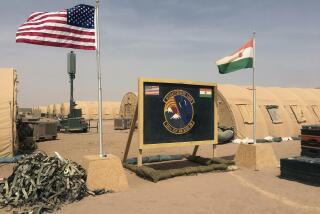U.S. Army Takes Over Marines’ Afghan Base
- Share via
KANDAHAR, Afghanistan — A famed U.S. Army paratrooper division took over the largest American military installation in Afghanistan on Saturday, taking command from Marines who were returning to their ships.
The hand-over was accomplished without a formal ceremony. The switch has been underway for a few days, with troops from the 101st Airborne Division relieving Marines from bunkers along the perimeter of the base established at Kandahar’s airport.
Although the Marines are shifting nonessential personnel, they will “retain the capacity for any missions that might pop up,” said Marine spokesman Lt. James D. Jarvis.
The base--in the former heartland of the Islamic extremist Taliban regime--remains tense more than a month after the Marines arrived.
Troops report frequent sightings of armed men outside the perimeter, and the base came under fire recently during the first flight carrying Al Qaeda and Taliban prisoners from a temporary detention facility to a high-security jail at the U.S. Guantanamo Bay naval base in Cuba.
Last week, a man claiming to have significant information about the Taliban showed up at the gate. He remained under interrogation Saturday, said Army spokesman Maj. Ignacio Perez, who declined to say whether the man was being formally held or would be free to leave if he wished.
About 2,000 Marines were at the Kandahar base at the height of their deployment, and military officials declined to say how many would remain as the Army takes over. Dispensing with base duties would free some Marines for quick deployment on other missions.
The United States raised the specter of renewed foreign meddling in Afghanistan on Friday, saying Iran might be sending pro-Iranian Afghan fighters to destabilize the newly installed U.S.-backed government.
The U.S. special envoy to Afghanistan, Zalmay Khalilzad, stopped short of directly accusing Iran of interference, but he cited unspecified reports that Afghan fighters and money were being sent from Iran into the volatile country to build opposition to interim Prime Minister Hamid Karzai.
“All of those things would be regarded as interference,” Khalilzad said in Kabul, the capital.
More to Read
Sign up for Essential California
The most important California stories and recommendations in your inbox every morning.
You may occasionally receive promotional content from the Los Angeles Times.










